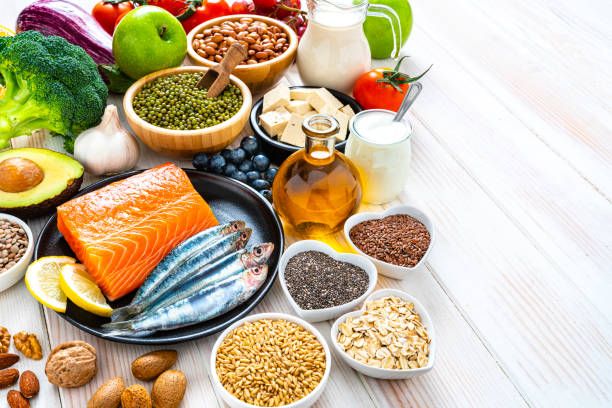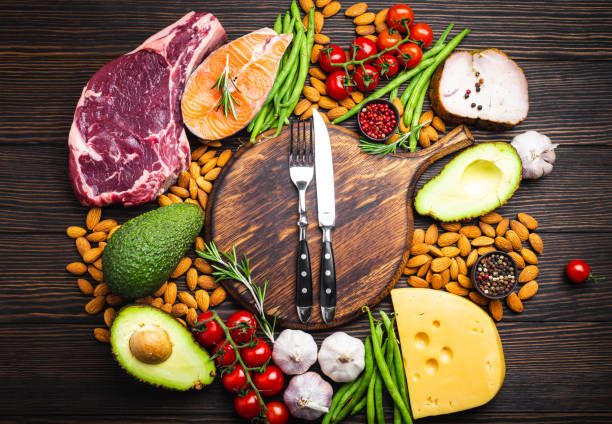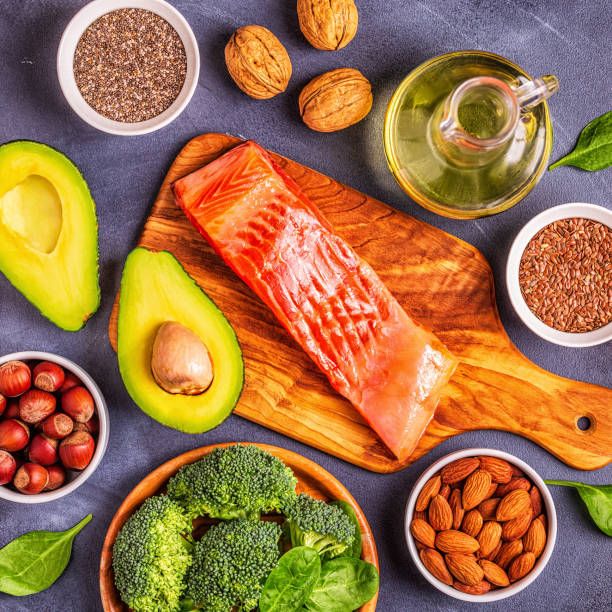I. Introduction
Healthy Fats – The focus on nutrition remains paramount in the ever-evolving health and wellness landscape. Amidst the myriad dietary advice, the significance of incorporating healthy fats often goes unnoticed. Imagine fats not as foes but as allies on your journey to optimal well-being. This article will unravel the wonders of healthy fats, exploring their diverse benefits and discovering where they can be found in abundance.
II. Understanding Healthy Fats: A Brief Overview
To comprehend the role of healthy fats, it’s essential to distinguish between the different types of fats. Saturated fats in animal products and certain oils can raise harmful cholesterol levels. On the other hand, unsaturated fats include monounsaturated fats (olive oil, avocados) and polyunsaturated fats (fatty fish, walnuts), which are beneficial when consumed in moderation. Unlike unhealthy trans fats, artificially created through hydrogenation and found in processed foods, healthy fats contribute to overall health.

III. The Benefits of Healthy Fats
1. Cognitive Health: Enhancing Your Brainpower with Omega-3 Fatty Acids
Omega-3 fatty acids, commonly found in fatty fish such as salmon, nuts like walnuts, and seeds like flaxseeds, are often praised for improving brain function. These essential fats satisfy your taste buds and offer numerous benefits for your brain. Extensive research shows that omega-3 fatty acids, specifically EPA and DHA, are vital for cognitive function and can protect against age-related cognitive decline.
How It Works:
Omega-3 fatty acids, a type of polyunsaturated fat, promote the growth of brain cells, strengthen the neural pathways, and improve the communication between brain cells. This neural enhancement translates into sharper memory, improved focus, and heightened cognitive abilities, making problem-solving and learning more effortless.
2. Heart Health: Nurturing Your Cardiovascular System
Healthy fats, mainly monounsaturated and polyunsaturated fats, are guardians of your heart. By incorporating sources like avocados, olive oil, and fatty fish into your diet, you’re not just indulging your palate but actively reducing the risk of heart disease. These healthy fats work wonders by lowering harmful cholesterol levels, known as LDL cholesterol, while increasing the levels of good cholesterol, HDL cholesterol.
How It Works:
Monounsaturated fats, present in foods like avocados and nuts, lower LDL cholesterol, preventing plaque buildup in your arteries. Omega-3 fatty acids, derived from fish oils and flaxseeds, have anti-inflammatory properties that maintain the elasticity of blood vessels, ensuring smooth blood flow. This combined effect fortifies your cardiovascular system, reducing the risk of heart attacks and strokes.
3. Hormonal Balance: Empowering Your Mood and Reproductive Health
Hormones are the messengers that regulate various bodily functions, from mood to reproductive processes. Healthy fats, especially those containing omega-3 and omega-6 fatty acids, are the unsung heroes behind hormonal balance. Incorporating sources like chia seeds, hemp seeds, and fatty fish provides your body with the building blocks to produce hormones efficiently, ensuring emotional stability and reproductive health.
How It Works:
When consumed correctly, omega-3 and omega-6 fatty acids support the production of prostaglandins, hormone-like substances that regulate inflammation, blood flow, and hormonal balance. By maintaining the correct balance of these fatty acids, you’re nurturing your hormones and empowering your mood, reducing the risk of depression, and promoting overall emotional well-being.
4. Nutrient Absorption: Maximizing the Benefits of Vitamins A, D, E, and K
Fat-soluble vitamins A, D, E, and K need fats for absorption. They’re crucial for vision and bone health. With healthy fats, they may be fully utilized.
How It Works:
Healthy fats act as carriers, escorting these fat-soluble vitamins through the digestive process and into your bloodstream. Once absorbed, these vitamins contribute significantly to your overall health. For example, vitamin A supports your vision and immune system; vitamin D strengthens your bones. Vitamin E is a potent antioxidant, and vitamin K aids blood clotting and bone metabolism. By ensuring the presence of healthy fats in your diet, you’re maximizing the benefits of these essential nutrients, promoting overall health and vitality.

IV. Sources of Healthy Fats: Where to Find Them
1. Healthy Plant-Based Sources:
- Avocado: Rich in monounsaturated fats, avocados are delicious and excellent for heart health and overall well-being.
- Nuts and Seeds: Almonds, chia seeds, and flaxseeds are nutrient-dense and can boost your health.
- Olive Oil: A vital part of the Mediterranean diet, olive oil is an exceptional source of monounsaturated fats. These promote healthy cholesterol levels and lower the risk of heart disease.
2. Healthy Animal-Based Sources:
- Fatty Fish: Salmon, mackerel, and trout are rich in omega-3 fatty acids, supporting brain health and reducing inflammation.
- Eggs: Despite high cholesterol levels, eggs are a nutrient-dense food containing healthy fats, proteins, vitamins, and minerals.
- Lean Meat: Choose lean cuts of meat, like skinless poultry, for healthy protein.
V. Myths and Misconceptions about Healthy Fats
In the realm of nutrition, myths about fats abound. Let’s debunk some prevalent misconceptions:
- All Fats Are Bad: Consuming healthy fats in moderation is essential for overall health.
- Low-Fat Diets Are the Healthiest: Eliminating all fats from your diet can deprive your body of essential nutrients, so it’s important to focus on reducing unhealthy fats.
- Fats Make You Fat: The truth lies in balance. Excessive calories from any source, be it fats, carbohydrates, or proteins, can lead to weight gain. Consuming healthy fats in moderate amounts is an essential component of a well-balanced diet.

VI. Tips for Incorporating Healthy Fats into Your Diet
- Cooking Oils: Opt for olive, coconut, or avocado oil. These oils are not only flavorful but also rich in healthy fats.
- Snack Smart: Instead of reaching for processed snacks, indulge in a handful of nuts or a slice of avocado on whole-grain toast.
- Creative Cooking: Experiment with healthy fat sources in your recipes. Make a nut butter smoothie, bake with avocado, or prepare a salmon-rich salad.
VII. Embracing a Healthier Lifestyle with Healthy Fats
Integrating healthy fats into your diet is more than just a casual decision – it’s a commitment to your overall health and well-being. By gaining knowledge about the different types of fats and their sources, you can make informed decisions about your diet that will lead to a healthier, happier life.
FAQ Section
Q1: Can I eat fats if I’m trying to lose weight?
A1: Yes, you can! Healthy fats in moderation provide a sense of satiety, preventing overeating and supporting weight loss goals.
Q2: Are all animal fats unhealthy?
A2: Not necessarily. While some animal fats are high in unhealthy cholesterol, lean meat and fatty fish cuts provide essential nutrients without excessive saturated fats.
Q3: How much healthy fat should I consume daily?
A3: It varies based on your caloric intake, but a general guideline is to aim for 20-35% of your total daily calories from fats, mostly from healthy fats.
Q4: Can I get enough healthy fats from plant-based sources alone?
A4: Plant-based sources like avocados, nuts, seeds, and olive oil provide healthy fats rich in omega-3 and omega-6 acids, supporting heart health, cognitive function, and overall well-being. Vegans should consider fortified foods or supplements for essential nutrients, like vitamin B12.
Q5: Are there specific healthy fats recommended for athletes and fitness enthusiasts?
A5: Athletes and fitness enthusiasts often benefit from healthy fats that sustain energy. Incorporating sources of medium-chain triglycerides (MCTs), such as coconut and MCT oil, can be advantageous. MCTs are quickly absorbed and converted into energy, making them an excellent choice for pre-workout meals or snacks. Balancing omega-3 fatty acids from sources like chia seeds and fatty fish supports joint health and reduces exercise-induced inflammation.
Q6: Can healthy fats help with skin health and aging?
A6: Healthy fats are essential for healthy skin and preventing premature aging. Omega-3 fatty acids in fatty fish, flaxseeds, and walnuts soothe skin and reduce redness, while monounsaturated fats in avocados and olive oil hydrate skin. You must include healthy fats in your diet for a more youthful appearance.
Conclusion: Nurturing Your Body with Healthy Fats
Remember that fats are not the enemy in your quest for a healthier lifestyle. Healthy fats in various delicious foods are your allies in achieving overall well-being. By embracing these nutrient-packed sources, you’re not just eating; you’re nourishing your body and mind, paving the way for a balanced, vibrant life.
Read also Sunburn Unmasked: Is it Sunburn or Sun Poisoning ?

